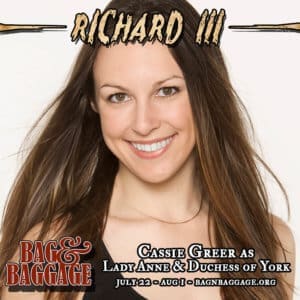- Skip to primary navigation
- Skip to secondary navigation
- Skip to main content
- Skip to primary sidebar
Imaginary Circumstances – Cassie Greer Blogs on R3!
 “Acting is living truthfully under imaginary circumstances.”
“Acting is living truthfully under imaginary circumstances.”
This sentence has been spoken to me hundreds, if not thousands of times, by teachers, directors, colleagues, friends… And it’s a phrase I find myself repeating over and over again to myself and to my students as I work at this beast of a job of “being an actor”. Usually credited to Sanford Meisner, though sometimes Konstantin Stanislavsky (both giants in the world of acting and actor training), the idea of “living truthfully under imaginary circumstances” is at the heart of what I (and, I think, most actors) do every day in rehearsal and performance, every time I set foot on the stage.
It’s a goal that is simultaneously challenging and familiar.
It’s an incredibly useful mantra.
And never has it been so hard for me to do as right now in this show.
If you remember reading Scott’s initial blog post about Richard III a few weeks back, you will have noted that the “twist” to our version of this story involves allowing the audience to experience it through the eyes of Richard himself: instead of Richard being disfigured, all the rest of us carry the mutations of the personal vices of our characters, as perceived by the central figure of this story.
This is “imaginary circumstance” number one, and the first challenge: how does my character appear to Richard?
 The other noteworthy element of this very “Bag&Baggage” Richard III is the style in which we are working. A play full of characters who are essentially personified vices (as interpreted by Richard, of course) looks very much like a Medieval morality play, or a Restoration comedy; correspondingly, the style of our production takes a page out of the Restoration book, with one of one-dimensional characters, presentational staging, and highly specific and stylized (and often grotesque) use of body, gesture, and physicality.
The other noteworthy element of this very “Bag&Baggage” Richard III is the style in which we are working. A play full of characters who are essentially personified vices (as interpreted by Richard, of course) looks very much like a Medieval morality play, or a Restoration comedy; correspondingly, the style of our production takes a page out of the Restoration book, with one of one-dimensional characters, presentational staging, and highly specific and stylized (and often grotesque) use of body, gesture, and physicality.
Here we have “imaginary circumstance” number two: the physical and intellectual rules of the world we are creating for this show. Or, as Scott like to remind us, the “physics of our universe”.
To sum up, my challenge here is to “live truthfully” as a personified vice, moving through and interacting with the world in a highly stylized manner.
This may sound like an impossibility, and I will grant you that some days it feels like one, but it is also true that without this key element of truthful living, there’s no reason to do this show. Richard III is a HUGE play – we are dealing with issues of life and death in every single scene; these characters are incredible icons of power; each and every relationship is long-standing and complicated by thousands of factors – and if we do not honestly ground our work in these realities, you’ll just be watching ten people with goofy walks and voices talking at each other for two hours. If you wanted to see that, you could just go visit a preschool classroom.
But this is Richard III, and this is the theatre, where we go to have an experience and to be moved. And unless we, the actors, are telling the truth, there’s no way you, the audience, will actually be able to experience this story at all.
So. Living truthfully under imaginary circumstances. Challenge yet again accepted. I’m not completely sure how to get there, but that’s part of the excitement and magic of the process, isn’t it? Come join us in a few weeks to see how it all turns out…
Cassie Greer
Resident Acting Company Member

Reader Interactions